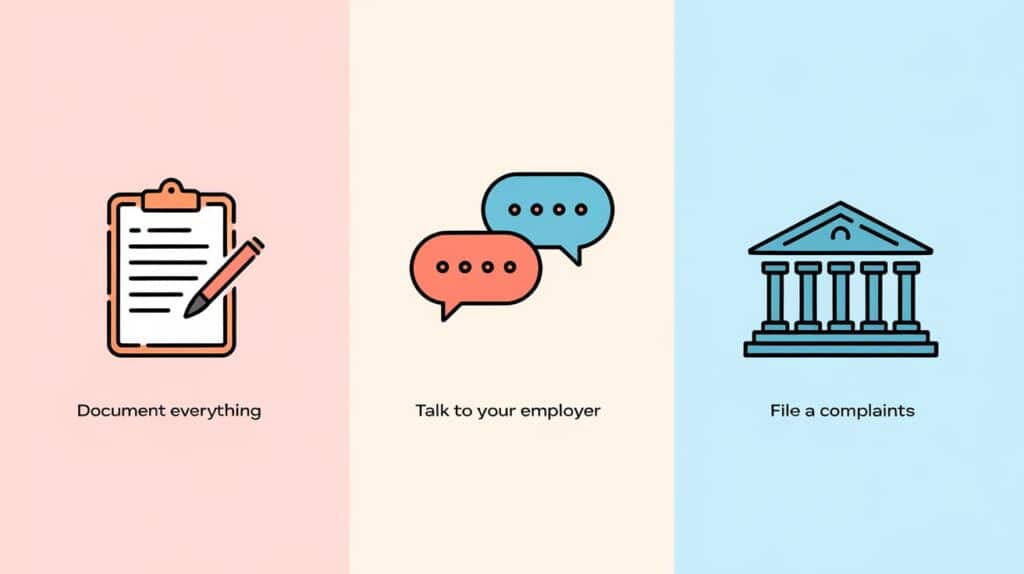You worked 45 hours this week, but your paycheck only reflects regular wages for all 45 hours, no overtime pay.
Your boss says that’s normal, but is it?
Unpaid overtime affects millions of American workers, with employers failing to make billions in overtime payments each year.
Some may not be aware of the rules, while others intentionally break them.
This blog will explain what overtime pay is, who qualifies for it, and the consequences employers face for violating overtime laws.
It will also cover both federal and Wisconsin-specific overtime regulations, common violations, and the steps workers can take to recover unpaid overtime wages.
What is Considered as Overtime Pay?
Overtime pay is an additional compensation for working extended hours. It rewards employees who put in more than standard work time.
The basic rule is simple. Work more than 40 hours in one week? You earn time-and-a-half pay for extra hours.
To calculate time-and-a-half, multiply your regular hourly rate by 1.5. If you earn $20 per hour, overtime pays $30 per hour.
It is illegal not to pay time and a half for overtime for most employees. This rule applies nationwide under federal law.
Who is Entitled to Overtime Pay?
Non-exempt employees receive overtime pay. This includes most hourly workers and some salaried employees.
Exempt employees are not entitled to overtime pay. To qualify as exempt, you must pass both requirements:
1. You need to earn at least $684 per week ($35,568 per year). Your pay must stay the same regardless of work quality or quantity.
2. You must perform executive, administrative, or professional work. Basic customer service or clerical work usually doesn’t qualify.
Do Salaried Workers Get Overtime Pay:
Yes, some salaried workers are entitled to overtime pay. The law doesn’t exempt someone just because they earn a fixed salary.
Those earning more may still qualify if their duties don’t meet the “executive, administrative, or professional” exemption.
Salary alone doesn’t determine overtime eligibility; it depends on pay and job duties.
What Does Law Say About Overtime Pay?
Federal law for overtime pay sets the foundation across America. Wisconsin builds on these protections through state enforcement and support.
Fair Labor Standards Act (FLSA) Overview
The Fair Labor Standards Act (FLSA)controls overtime pay nationwide.
This federal labor law on overtime has protected workers since 1938. It also requires overtime pay for covered employees.
Most private employers must follow these rules.
Time-and-a-half pay is mandatory for non-exempt employees working over 40 hours per week.
Employers can’t substitute comp time or bonuses.
Penalties for FLSA Violations
Employers who violate overtime laws face serious consequences, including back pay for all unpaid overtime, equal damages (liquidated damages), civil penalties of up to $2,156 per violation, and criminal prosecution for willful violations.
The Department of Labor investigates complaints and enforces these penalties.
Wisconsin’s Adherence to Federal Rules
Unpaid overtime is illegal in Wisconsin under federal law.
The state follows all federal overtime requirements. It doesn’t have separate overtime laws with different standards.
Wisconsin’s Department of Workforce Development (DWD) enforces overtime laws within the state.
The DWD works with federal agencies on complex cases.
Wisconsin employers face the same penalties as federal law, including unpaid overtime wages, additional damages, interest on overdue payments, and legal fees.
Is it illegal not to pay overtime under federal law? Yes, and Wisconsin enforces this strictly.
Common Overtime Violations
Employers break overtime laws in predictable patterns. Understanding these violations helps you identify potential issues with your own pay.
1. Misclassification of Employees
Employers often misclassify workers as exempt to avoid overtime pay. This happens when assistant managers, team leads, or office staff perform mostly hourly or clerical duties.
Supervisors without real hiring or firing authority also face this issue.
If you track hours, have limited decision-making power, or perform the same tasks as non-exempt coworkers, you may be misclassified.
2. Off-the-Clock Work Violations
All work time counts toward your 40-hour limit. Common violations include working off the clock through unpaid breaks, answering emails after hours, arriving early, staying late, or attending required training.
Employers must include all these hours when calculating overtime.
3. Pay Structure Violations
Private employers can’t offer compensatory time instead of overtime pay; only government agencies can.
Averaging hours across weeks is illegal; each week is counted separately.
Paying straight time for overtime hours also breaks federal law, which requires time-and-a-half pay for hours beyond 40 per week.
See how working 7 days a week connects with overtime rules.
What to Do If You’re Owed Overtime Pay?

Think your employer owes you money? You’re not powerless. Taking the right steps can help you recover unpaid wages and protect your rights.
Step 1: Document Everything
Start by gathering proof before taking any action. The more evidence you have, the easier it is to show exactly what you’re owed.
Pull together your pay stubs, timesheets, and work schedules. Check time clock logs or digital login records if you have them.
Save any emails or texts that show work done outside regular hours, and keep copies of the company’s overtime policies.
Write down conversations you’ve had about overtime or pay. Every detail helps later.
Step 2: Talk to Your Employer
Once your records are ready, give your employer a chance to make things right. A clear, respectful conversation can often resolve the issue quickly.
Show them what you’ve found: your hours, your calculations, and where things don’t match.
If they agree to fix it, ask for it in writing, including how much they’ll pay and when.
Be polite but firm, and set a reasonable deadline for them to respond.
Step 3: File Official Complaints
If talking doesn’t work, it’s time to take formal action. State and federal agencies can step in to ensure you receive the overtime pay you’ve earned.
You can file wage complaints with the Wisconsin Department of Workforce Development online through their portal. They investigate violations and can order payment.
You can also submit complaints to the U.S. Department of Labor through their website or local field offices. Federal investigators have broad enforcement powers.
Both agencies can work simultaneously on your case. This provides stronger protection and faster resolution.
Legal Rights and Remedies for Overtime Pay
When employers violate overtime laws, you have strong legal protections. The law provides multiple avenues for recovering your money and protects you from employer retaliation.
What Compensation can you Recover?
You can recover several types of compensation. Back pay covers all wages owed at time-and-a-half rates for hours over 40 per week.
Liquidated damages equal your unpaid wages. Courts award this for willful violations by employers.
Interest accumulates on unpaid amounts from when wages were originally due until payment.
If you win in court, employers often pay your legal costs too.
1. Statute of Limitations for Claims
Most overtime claims have a two-year limit. You can recover unpaid wages going back two years from the filing date.
Willful violations have a three-year limit. Courts extend this when employers intentionally break overtime laws.
Time limits vary by situation. Don’t delay filing complaints if you suspect violations.
2. Protection from Retaliation
Employers can’t punish workers for asserting overtime rights.
Federal law prohibits retaliation against employees who file wage complaints with government agencies.
Protection also covers workers who participate in overtime investigations.
You’re protected if you testify in wage and hour proceedings. The law also protects employees who oppose illegal wage practices.
Retaliation penalties are separate from overtime violations. Employers face additional damages for retaliatory actions.
Exemption Categories for Overtime Pay
Exemption categories define which employees are not eligible for overtime pay, based on specific criteria such as job duties, decision-making authority, and specialized knowledge.
These classifications help determine whether an employee’s salary covers all hours worked, even during extended workweeks.
Executive Exemption
- Manage two or more employees.
- Authority to hire and fire.
- The primary duty is management.
- No overtime pay; salary is the same for 40–60 hours/week.
Administrative Exemption
- Perform office work related to business operations.
- Use independent judgment on important matters.
- Salary covers all work hours; extra hours are not paid.
Professional Exemption
- Requires advanced knowledge in science, learning, or the arts.
- Typically needs a college degree.
- Salary remains constant, regardless of long projects or busy periods.
Conclusion
Is it illegal not to pay overtime? Absolutely yes, as federal law requires most workers to receive time-and-a-half for hours worked beyond 40 per week.
Federal law protecting overtime pay applies to most workers across the nation. Wisconsin enforces these rules through state and federal agencies.
Understanding the exemption for overtime pay requirements helps you identify violations.
Laws about salary overtime have specific criteria for exemption. Don’t let employers misclassify you to avoid paying overtime wages.
Unpaid overtime costs workers billions annually. Check your pay stubs carefully. Track your work hours accurately. Take action when something looks wrong.
Need help with your overtime pay situation? Contact a local employment attorney for personalized legal advice about your specific case.
Frequently Asked Questions
Can My Employer Make Me Work Overtime?
Yes, employers can require employees to work overtime. However, they must pay time-and-a-half rates for all hours over 40 per week.
What if I’m Paid a Salary?
Salary doesn’t eliminate overtime rights. You must meet the salary and duties requirements for exemption. Many salaried workers still qualify for overtime.
Can I Receive Overtime Pay for Working on Holidays?
Holiday work doesn’t create overtime pay by itself. Only total hours over 40 in the workweek generate overtime requirements.
Can My Employer Average My Hours Over a Two-Week Period?
No. Each workweek stands alone for overtime calculations. Employers can’t use biweekly averaging to avoid overtime payments.










